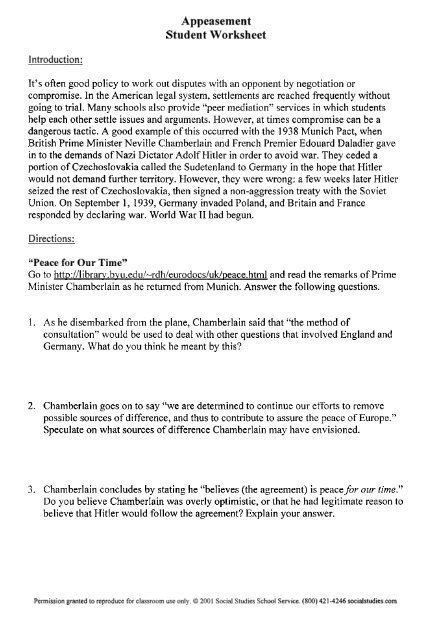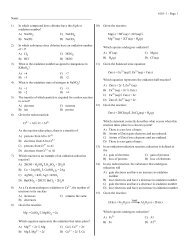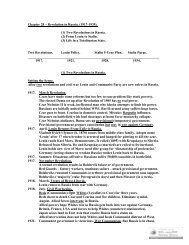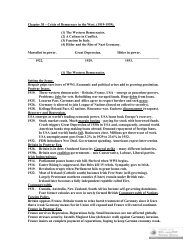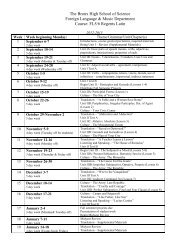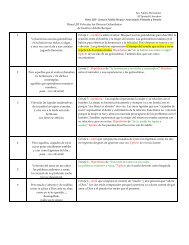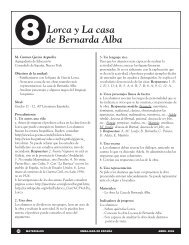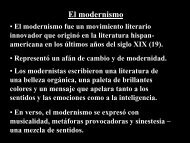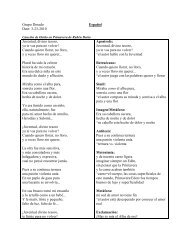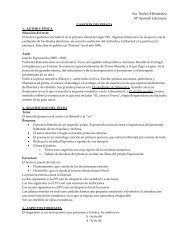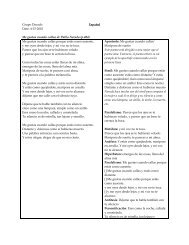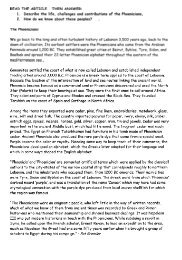Appeasement.pdf
Appeasement.pdf
Appeasement.pdf
Create successful ePaper yourself
Turn your PDF publications into a flip-book with our unique Google optimized e-Paper software.
Introduction:<br />
<strong>Appeasement</strong><br />
Student Worksheet<br />
It's often good policy to work out disputes with an opponent by negotiation or<br />
compromise. In the American legal system, settlements are reached frequently without<br />
going to trial. Many schools also provide "peer mediation" sewices in which students<br />
help each other settle issues and arguments. However, at times compromise can be a<br />
dangerous tactic. A good example ofthis occurred with the 1938 Munich Pact, when<br />
British Prime Minister Neville Chamberlain and French Premier Edouard Daladier gave<br />
in to the demands of Nazi Dictator Adolf Hitler in order to avoid war. They ceded a<br />
portion of Czechoslovakia called the Sudetenland to Germany in the hope that Hitler<br />
would not demand further territory. However, they were wrong: a few weeks later Hitler<br />
seized the rest of Czechoslovakia, then signed a non-aggression treaty with the Soviet<br />
Union. On September 1, 1939, Germany invaded Poland, and Britain and France<br />
responded by declaring war. World War I1 had begun.<br />
Directions:<br />
"Peace for Our Time"<br />
Go to htt~:lllibra~li.bvu.edu/-rdh/eurodocs/uWeace.ht~nl and read the remarks of Prime<br />
Minister Chamberlain as he returned from Munich. Answer the following questions.<br />
1. As he disembarked from the plane, Chamberlain said that "the method of<br />
consultation" would be used to deal with other questions that involved England and<br />
Germany. What do you think he meant by this?<br />
2. Chamberlain goes on to say "we are determined to continue our efforts to remove<br />
possible sources of difference, and thus to contribute to assure the peace of Europe."<br />
Speculate on what sources of difference Chamberlain may have envisioned.<br />
3. Chamberlain concludes by stating he "believes (the agreement) is peacefor our time."<br />
Do you believe Chamberlain was overly optimistic, or that he had legitimate reason to<br />
believe that Hitler would follow the agreement? Explain your answer.<br />
Permission granted to reproduce for classroom use only. O 2001 Social Studies School Service. (800) 421-4246 soeialrtudieseam
The British Parliamentary Debate on the Munich Agreement<br />
Next, go to htto://I 38.1 10.28.9/acadlintrellmunich,htm and read Winston Churchill's<br />
speech from the Parliamentary debate on the Munich agreement. (Note: it will be<br />
necessary to scroll down the page to find Churchill's speech.) Answer the following<br />
questions:<br />
4. In the opening paragraph, Churchill states bluntly, "we have sustained a total and<br />
unmitigated defeat, and that France has suffered even more than we have." Later in<br />
the speech, he notes, "we are in the presence of a disaster of the first magnitude. .."<br />
Do you think this statement was based on military or political facts, or was it partisan<br />
rhetoric said as a member of the opposition party? In a few sentences, defend your<br />
position.<br />
5. At various parts of Churchill's speech, Viscountess Astor, who makes comments such<br />
as "Nonsense," and "Rude," interrupts him. Do you think members of the U.S.<br />
Congress would interrupt one another and say similar things during debate over a bill<br />
or treaty? Why or why not?<br />
6. In other remarks, Churchill notes that with the Munich agreement "Britain and France<br />
had to choose between war and dishonor. They chose dishonor. They will have war."<br />
Based on what you have read in the Parliamentary debates, do you think Churchill's<br />
view was a popular view? Speculate on what political risks Churchill might have<br />
faced by making such statements.<br />
7. Note that no representatives from the Czech govemment nor from the Soviet<br />
govemment were present at the Munich conference, nor did they sign the documents<br />
giving the Sudetenland to Germany. Do you believe it was fair for Britain and France<br />
to decide the future of Czechoslovakia without giving the Czechs a voice in the<br />
negotiations? Since it bordered Czechoslovakia, should the Soviet Union have been<br />
included in the talks? Write a "point-counterpoint" article discussing both sides of<br />
this issue. Be sure to include your own opinion as to whether the process was fair.<br />
Permission granted to reproduce for classroom use only. 0 2001 Social Studies School Service (800)421-4246 rocialstudies.com


